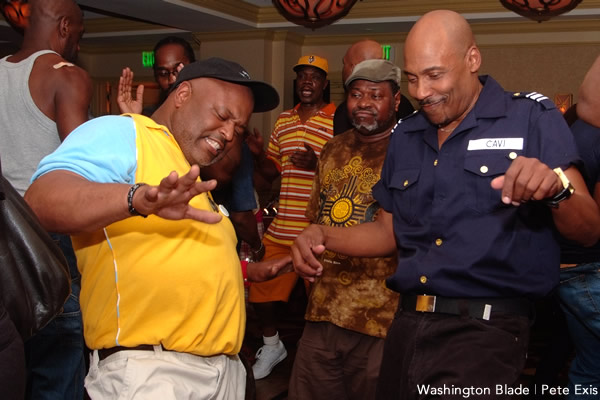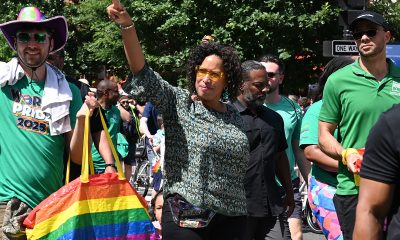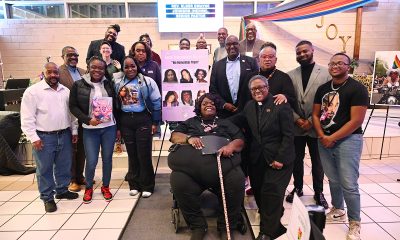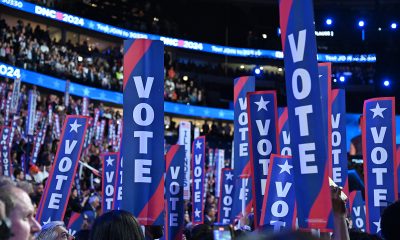Arts & Entertainment
‘This is a very big deal’
Obama, NAACP announcements infuse Black Pride festivities with celebratory flair
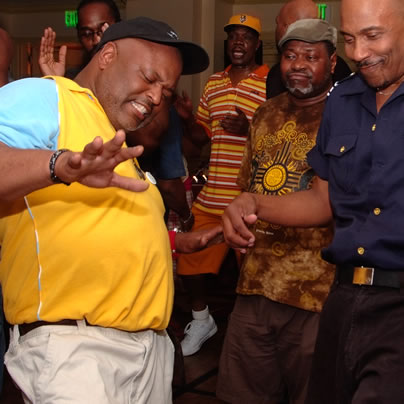
Change is in the air and prominent local black LGBT activists say its effects will be palpable at this weekend’s Black Pride festivities.
It’s debatable what led to the timing of President Obama’s announced change of heart on same-sex marriage — he told ABC’s Robin Roberts in a May 9 interview that he “think(s) same-sex couples should be able to get married,” an unprecedented statement for a sitting U.S. president — but whether it was the timing of the North Carolina amendment to ban same-sex marriage, Vice President Joe Biden’s shockingly unbridled comments the weekend before on “Meet the Press” or just the final stop on his self-proclaimed “evolution” on the issue, the announcement came as a shock to many, especially since it’s an election year. But the comments and the subsequent announcement by the NAACP of its endorsement of same-sex marriage make for a radically altered climate for D.C. Black Pride and several other piggy-backing black LGBT events happening this weekend.
Local black activists and promoters say almost universally it’s an exciting turn of events.
“It made me very happy,” says Kenya Hutton, a Black Pride board member. “Being the first American president to do so is very important.”
“I was absolutely elated,” says Linda McAllister, owner of D.C. lesbian bar Lace. “It’s a very historic moment … It’s unbelievable. I could not have been more pleased.”
“My first reaction was, ‘Yes, thank God he did it,’” says lesbian event promoter Ebone Bell. “It was like, ‘Thank you,’ for the first time in history we have a president who stood up for the right thing.”
Others say the announcement itself was not such a shock, so much as the timing of it.
“My initial thoughts were ones of astonishment that a sitting president up for reelection would come out so strongly in support, that’s the first thing,” says lesbian Khadijah Tribble. “Then I thought, yes, this is the man we all got behind as a staunch supporter of LGBT rights, so I was not surprised on one level but I just didn’t expect this timing at all.”
Sharon Lettman-Hicks, who prefers the term “sister of the movement” to straight ally (she’s married to a man but is also executive director of the LGBT rights group National Black Justice Coalition), agrees.
“I was extremely proud,” she says. “I was in shock and awe, but also just extremely proud that he would do this in such a polarizing political climate, but he was willing to step outside of the world of politics and really put human dignity first.”
And although the announcement has no legislative impact — marriage in the U.S. continues to be largely a state issue — many locals the Blade spoke to for this piece say it’s still a watershed moment because it’s giving straight black Americans a forum in which to discuss the LGBT people in the community.
The announcement has many angles — the fact that Obama, as the first U.S. president of color, is the first sitting president to make such an unequivocal statement is one thing. But it’s perhaps doubly significant that Obama is black since many African-American Baptist ministers preach anti-gay theology. White U.S. clergy do as well, of course. Just this week, the YouTube-posted video of North Carolina minister Charles Worley advocating putting gays and lesbians in an electrified pen like cattle until they starve to death went viral. But there’s perhaps a vociferousness to the rhetoric in black America that is often a bit different.
“It’s going to take a while to digest the issue but the big thing is that people are talking about it now,” says Earl Fowlkes, president of the Federation of Black Prides and also a long-time board member for D.C. Black Pride. “To have a black president talking about gay issues and same-sex marriage, these things are largely unspoken of in the black community, which is pretty much where the straight white community was 10 years ago. But when the president speaks and you have an organization as well respected as the NAACP, where half the chapter presidents are church people and they’re saying, ‘What’s the big deal?,’ it allows activists like myself to step forward and gives us ammunition.”
Several interesting points come up in these conversations — Tribble says that growing up in the South, black LGBT people were largely accepted as long as they abided by an unwritten “Don’t Ask, Don’t Tell”-type social policy.
“There were a lot of LGBT people growing up that although technically they were closeted, we all knew it,” she says. “They were still accepted within the church, they were still at the family cookouts, this is Aunt so-and-so and the aunt’s best friend who’s always with her. They came to everything and really weren’t treated any differently, but we just didn’t name it or talk about it even though they still had a place in the African-American community.”
Sheila Alexander-Reid says Obama’s announcement gives straight black Americans a catalyst to finally talk about LGBT issues.
“This way they can say, ‘What do you think about what Obama said,’ not, ‘What do you think about Johnny or Suzie?,” she says. “These are conversations that are long overdue. A lot of these people are very entrenched in their homophobia.”
Lettman-Hicks says black straight Americans aren’t so much squeamish about LGBT issues as they are uncomfortable with any talk of sexuality.
“It’s not an LGBT issue, it’s a sexuality issue in which LGBT issues fall under that,” she says. “If you want to have an intelligent debate about black people, you have to understand black people and black sexuality … so many discount the challenges that our community has faced. We were beaten, raped, brought here and sold as slaves, there’s a level of indignity that we faced as an oppressed people so in many ways we’re having the wrong conversation. Black America needs to have a robust conversation about human sexuality in general.”
She says, though, that Obama and the NAACP’s positions are excellent jumping-off points for those discussions.
But what about Obama’s reelection odds — will the LGBT support he picks up offset straight black Americans who may jump ship?
“I think it will help him overall,” says SaVanna Wanzer, a transgender activist and Whitman-Walker Health board member. “Number one, because it was the right thing to do. I think he will lose some support, yes, but the people who want human interests and civil rights first will still be on his side.”
“There will be some who back off, but no one in my family in Alabama is not going to vote for him because of this issue, I’m sure,” Tribble says. “Even the ones who tell me I’m going to hell, they still think I’m going to hell, but they won’t back away from Obama just because of this.”
Others say that while Obama’s statements are to be celebrated, the black LGBT community in D.C. spends too much time worrying about marriage rights when it has more pressing issues — transgender health, homelessness, HIV/AIDS, drug abuse and more — that should be on the front burner.
“I usually refrain from commenting,” says Earline Budd, a long-time advocate for disadvantaged transgender D.C. residents. “Day in and day out, like right here just now in my office, I have a 21-year-old HIV-positive person with a major infection. I just don’t have time to think about marriage. I do believe those who are out there on the front lines in the marriage battles, that we need that, but it’s just not on my agenda at this time … This whole thing with HIV, which is affecting more and more young people all the time, is much more pressing.”
Wanzer agrees.
“I’m thankful for his support, but there are much more pressing needs, especially with the transgender community,” she says.
Even so, many expect the Black Pride festivities to have an increased excitement and energy this year because of recent events.
“I know Eleanor [Holmes Norton] will be commenting on it, the mayor will be commenting on it, there’s definitely going to be a huge acknowledgement about this at Black Pride,” Fowlkes says. “Every time I’m at the mic, I’ll say something about it. What you’re really doing is giving people permission to celebrate it … we’re going to be making that acknowledgement at all our events so people can clap and feel happy because this is a very big deal.”
Black Pride, related events abound this weekend
Today (Friday)
An opening reception is held for Leandrea Gilliam this evening at 6:30 at the Hyatt Regency (400 New Jersey Ave., N.W.). Gilliam is the care advocacy program manager of the Sexual Minority Youth Assistance League and a Wellmore Cook Community Service Awardee. Admission to this event is free. For details, go to dcblackpride.org.
Author of “King Peggy,” Peggielene Bartels, signs copies of her book tonight at 7:30 at the Hyatt Regency (400 New Jersey Ave., N.W.). The book is about Bartels’ journey to becoming king of the African village Otuam in Ghana. The book costs $25. Proceeds will go to the nonprofit organization, Otuam Community Development Corp. Find more information at dcblackpride.org.
RainbowConnects is hosting speed dating in the Yellowstone/Everglades Room at the Hyatt Regency (400 New Jersey Ave., N.W.) tonight at 7. Admission is free. For details, visit dcblackpride.org.
“She’Baltimore,” a play written and directed by Ira Kip, opens at Warehouse Theater (1071 7th St., N.W.) tonight at 8. Admission is $25. For more information, email [email protected] or go to dcblackpride.org.
The 5000 Men Pride Mega Party featuring Ashanti is tonight at FUR Night Club (33 Patterson St., N.E.). Doors open at 10. Cover charge ranges $20-$50. For more information, visit omegapartydc.net.
Saturday, May 26
Representatives from Capital One Bank will be on-site at the Capital One Job Fair held from 11 a.m.-3 p.m. in the Olympic Room at the Hyatt Regency (400 New Jersey Ave., N.W.). The event is free. For details, visit dcblackpride.org.
Angela Harvey presents “The Key to the Perfect Orgasm” today at 12:30 at the Hyatt Regency (400 New Jersey Ave., N.W.) in Congressional Room A. Admission is free. For more information, visit dcblackpride.org.
New York Life Job Fair is held in the Sequoia Room at the Hyatt Regency (400 New Jersey Ave., N.W.) today from 12:30-3 p.m. The event is free. For details, visit dcblackpride.org.
A film festival is being held at the Hyatt Regency (400 New Jersey Ave., N.W.) from 2-5 p.m. The films that are playing include “Change,” “Finding Me: Truth” and “Taboo Yardies.” Admission is $15. For details, visit dcblackpride.org.
Terry W. Sidney is reading “The Four of Us” at the Mead Lab Theater (916 G St., N.W.) today at 2 p.m. Admission is $20. For more information visit beyonddarkcorners.com or dcblackpride.org.
Chocolate City Pride hosts the Tropical Heat Rooftop Party today from 3-8 p.m. on top of the Ibiza Roof (1222 1st St., N.E.). The event will include free food. Admission is $10. For more information, visit omegapartydc.net.
Buttafly Soul is hosting a Poetry Slam today from 5-8 p.m. at the Hyatt Regency (400 New Jersey Ave., N.W.). Admission is $15. For details, visit dcblackpride.org.
Black Men’s Xchange D.C. presents Revelation tonight at 7 at the Hyatt Regency (400 New Jersey Ave., N.W.). The panel discussion will be moderated by the reality T.V. star Karamo Brown. For details, visit dcblackpride.org.
Layla Lounge (501 Morse St., N.E.) hosts the annual Manhunt Party tonight from 9 p.m.-3 a.m. Passes are on sale at omegapartydc.net.
A soul train dance party is being held at the Hyatt Regency (400 New Jersey Ave., N.W.) tonight from 10 p.m.-1 a.m. The event features DJ Mandrill. Admission is $15. For details visit dcblackpride.org.
Lace Nightclub (2214 Rhode Island Ave., N.E.) hosts Insomniac, the after-party tonight from 3:30-8 a.m. Complimentary breakfast will be provided. For details, visit omegapartydc.net.
Sunday, May 27
A faith service is today from 9-11 a.m. at the Hyatt Regency (400 New Jersey Ave., N.W.). The event is free. For more information, visit dcblackpride.org.
“It’s a Family Affair” is held at Francis-Stevens Educational Campus (23 & O St., N.W.) today from noon-6. Admission is free. For details, visit dcblackpride.org.
Island Inferno annual pool party takes place at Great Waves Water Park (4001 Eisenhower Ave., Alexandria, Va.) today at 3. There will be free food, cash bar and a body contest. For more information visit omegapartydc.net.
Klimex Mega Party is tonight at the Love Nightclub (1350 Okie St., N.E.) from 9 p.m.-4 a.m. Table reservations begin at $500. For details, visit omegapartydc.net.
Monday, May 28
Chocolate City Pride hosts a cookout at Fort Dupont Park (3600 F St., S.E.) today from noon to 5 p.m. For more information, visit omegapartydc.net.
Layla Lounge (501 Morse St., N.E.) hosts the Apocalypse party tonight from 9 p.m.- 2 a.m. Admission is $10. For details, visit omegapartydc.net.
— ERIN DURKIN
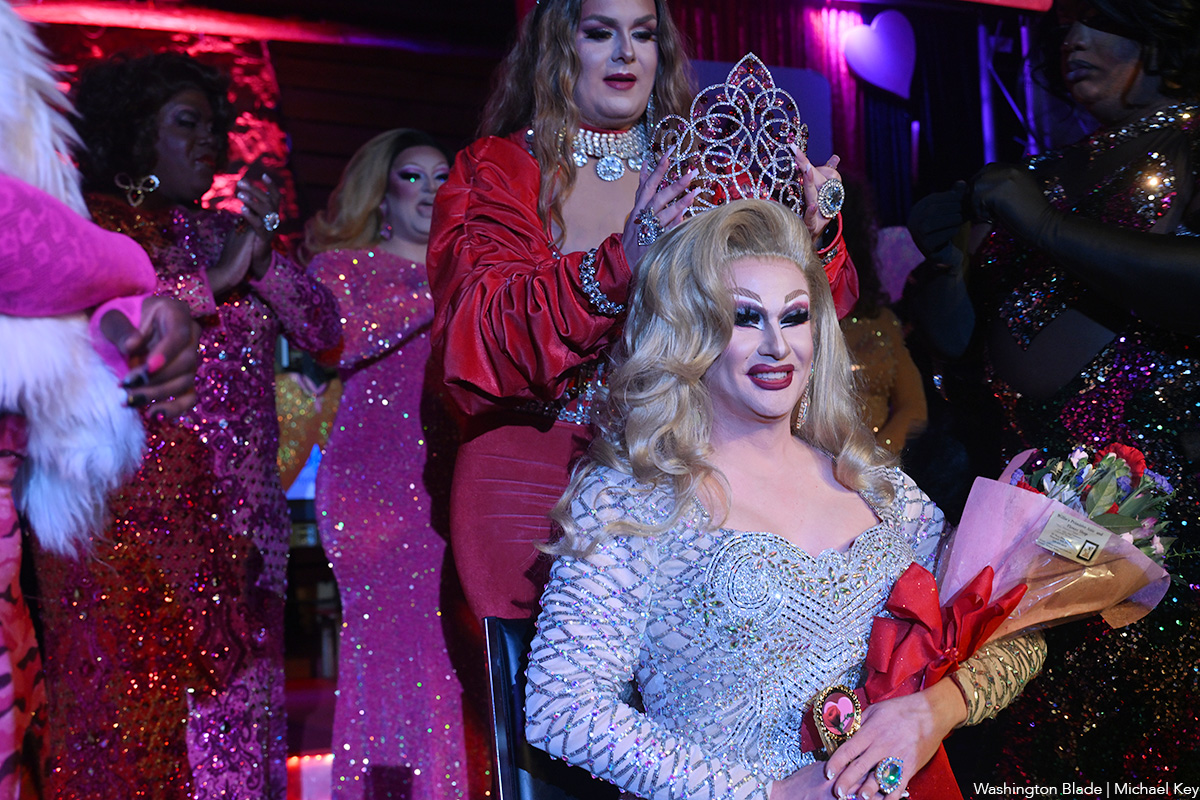
The 44th annual Queen of Hearts pageant was held at The Lodge in Boonsboro, Md. on Friday, Feb. 20. Six contestants vied for the title and Bev was crowned the winner.
(Washington Blade photos by Michael Key)
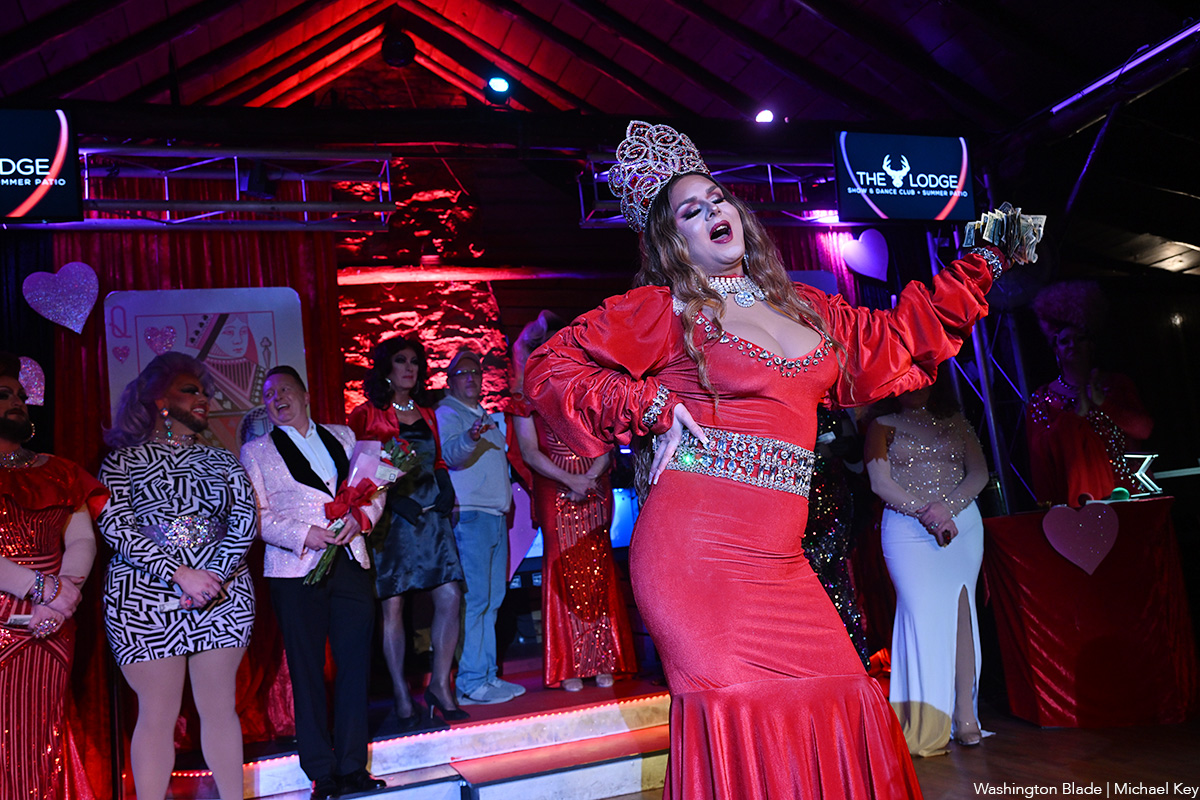
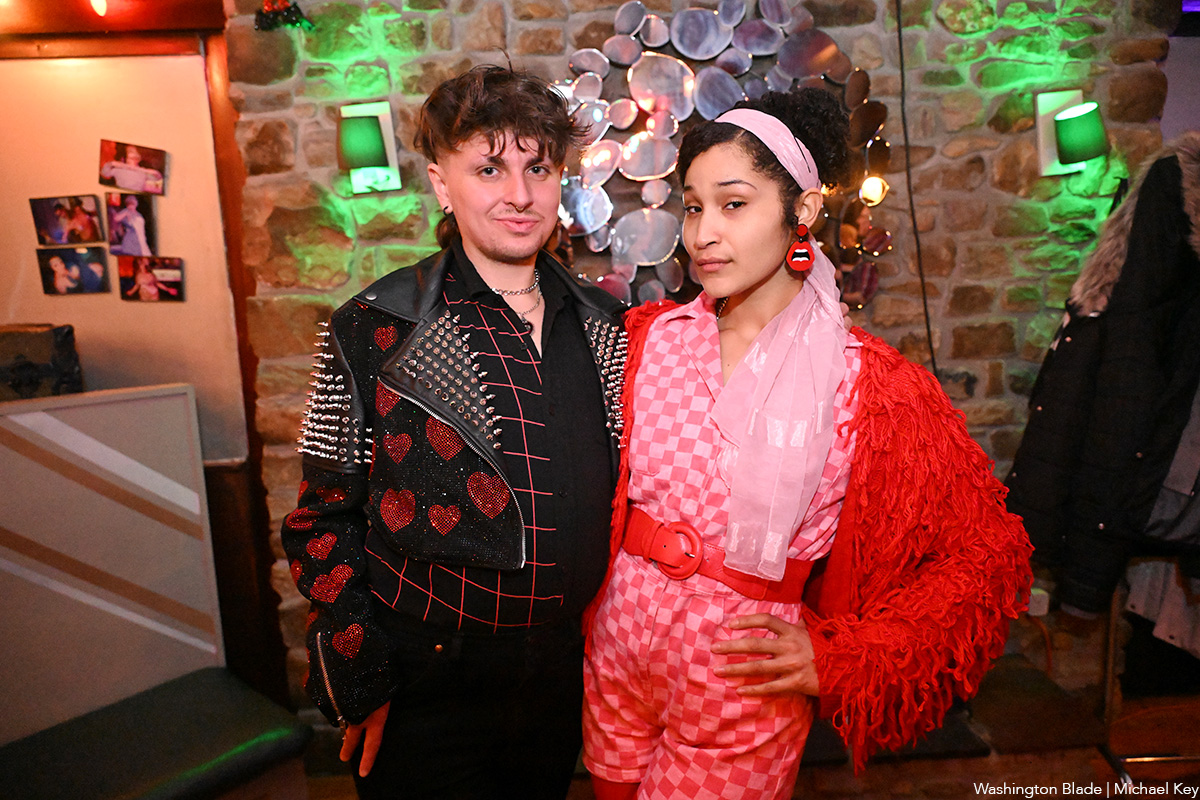
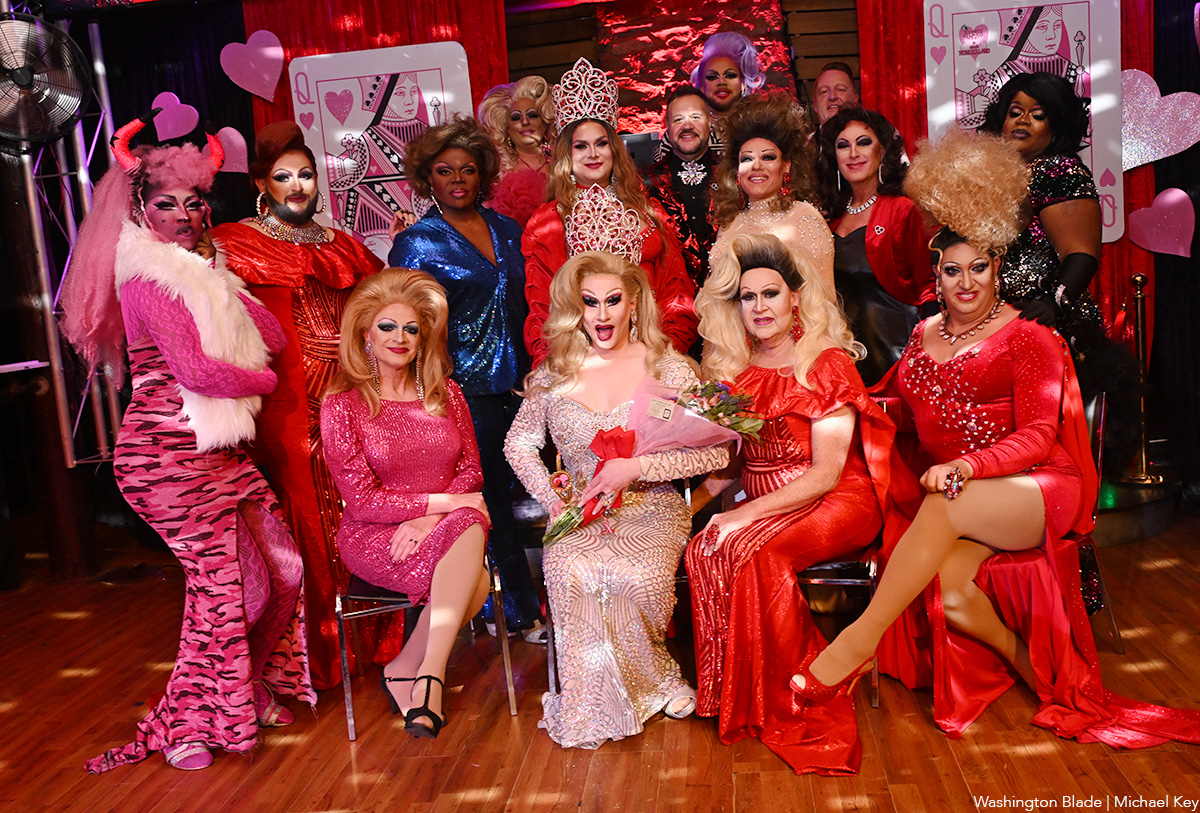
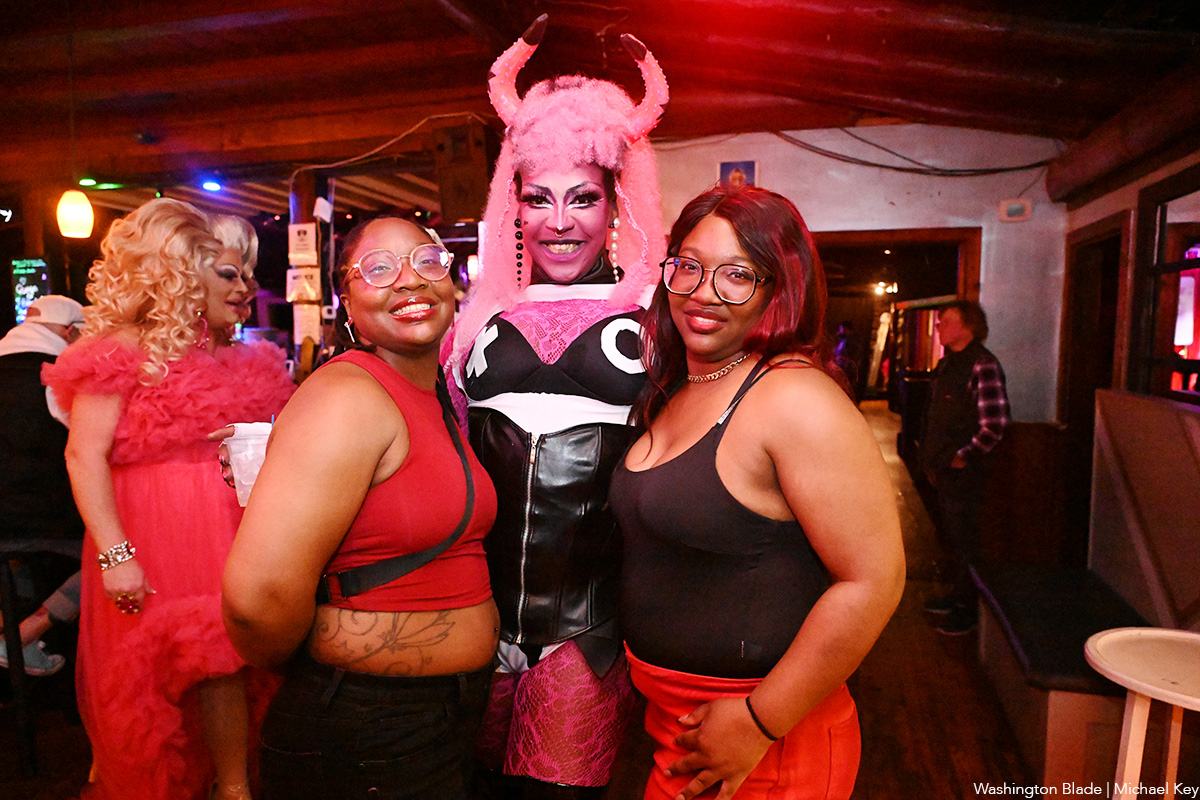
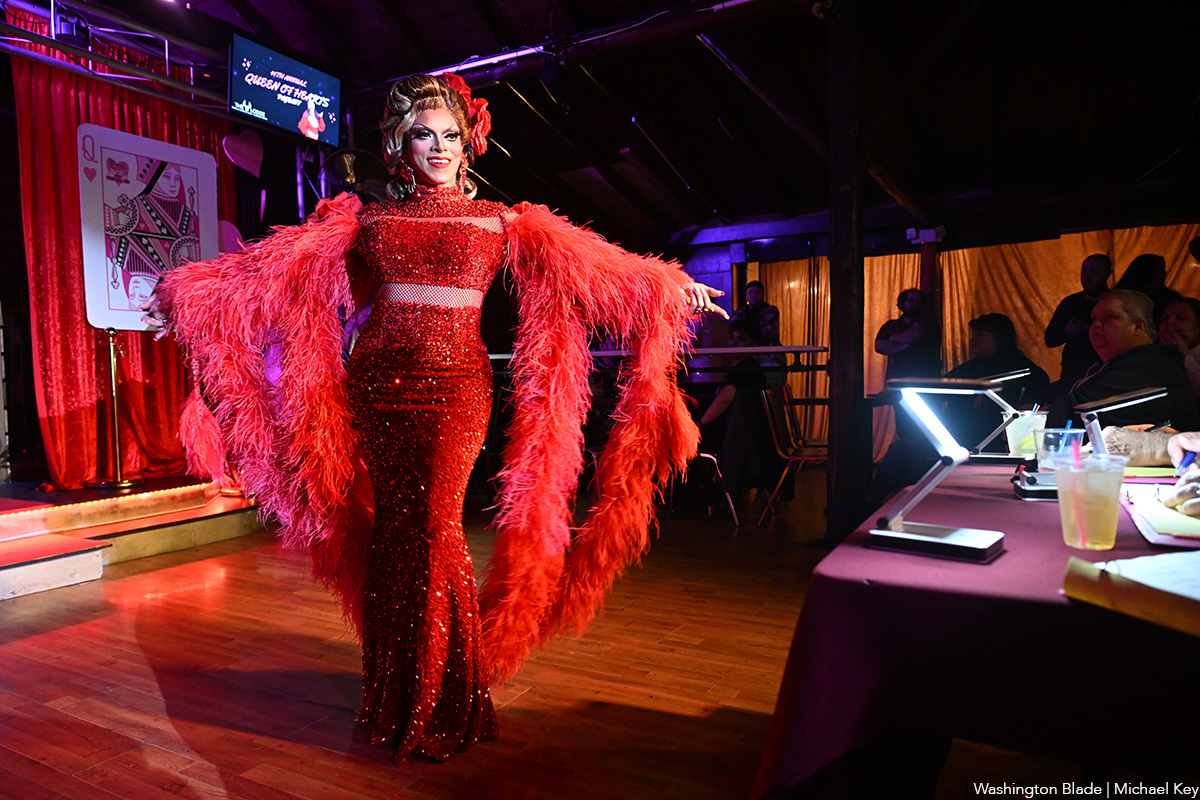
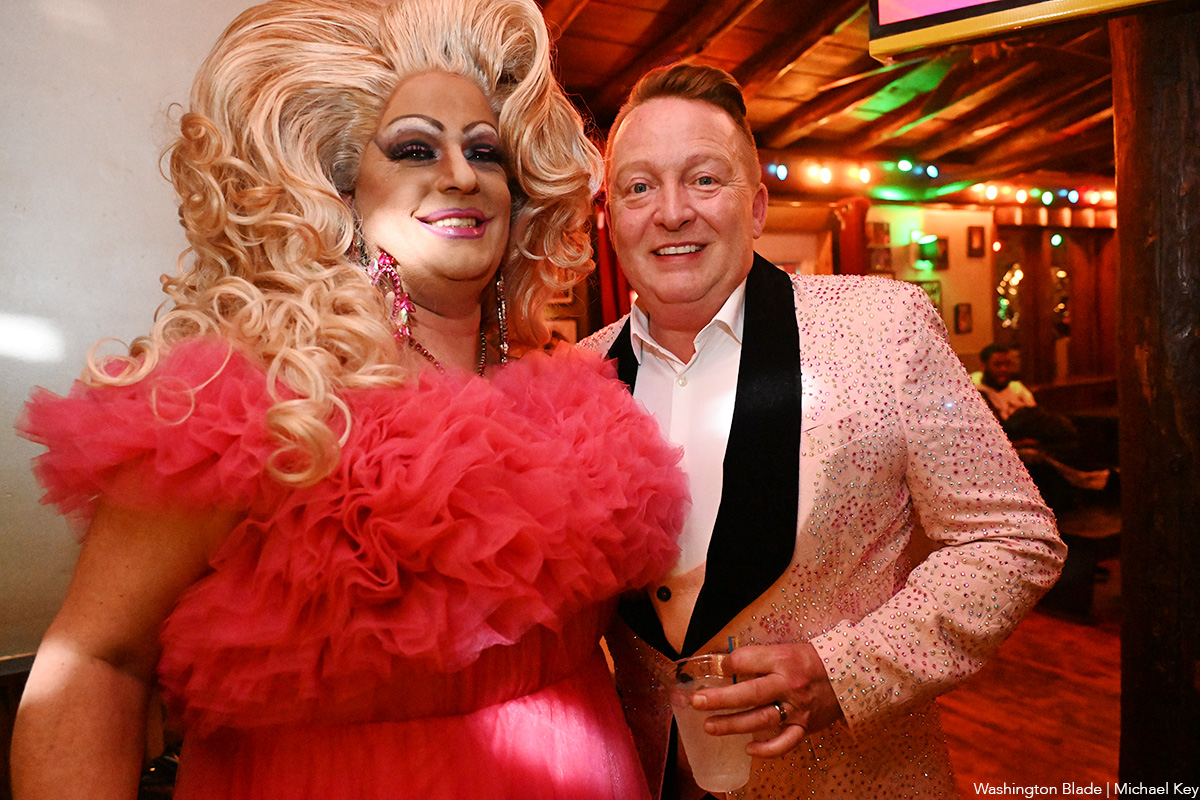
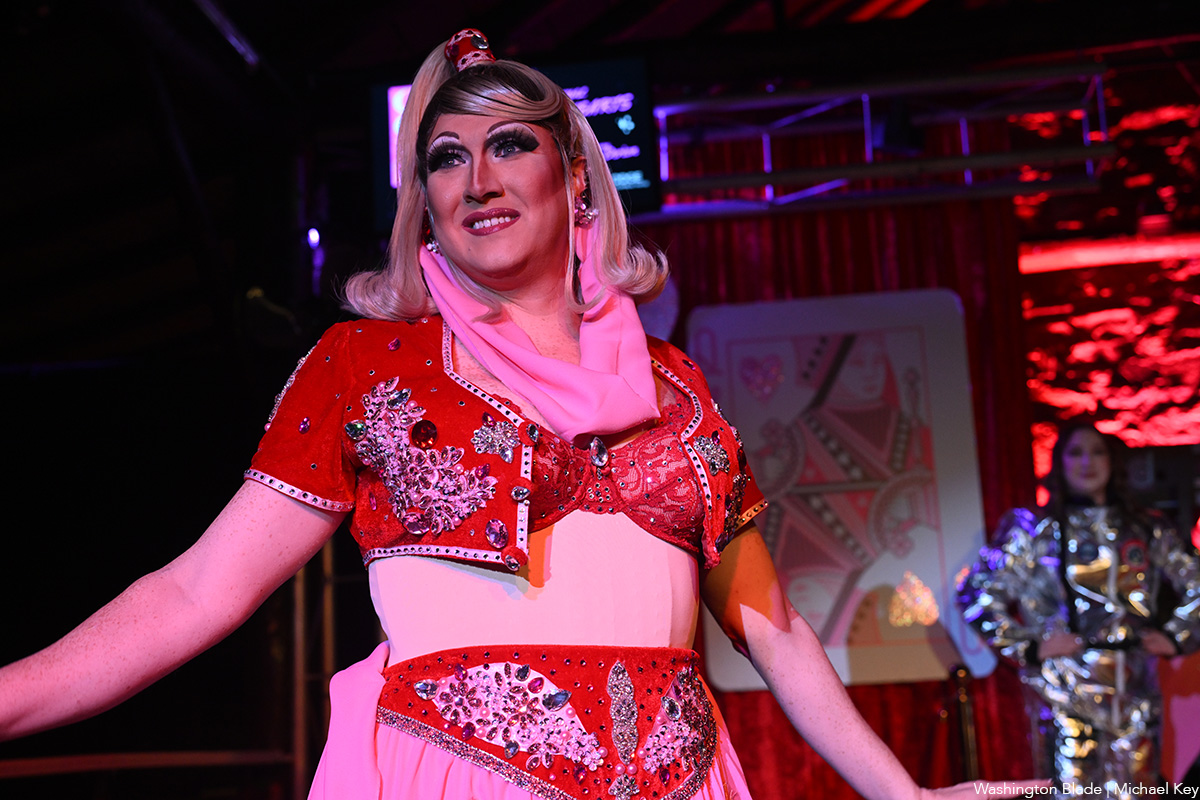
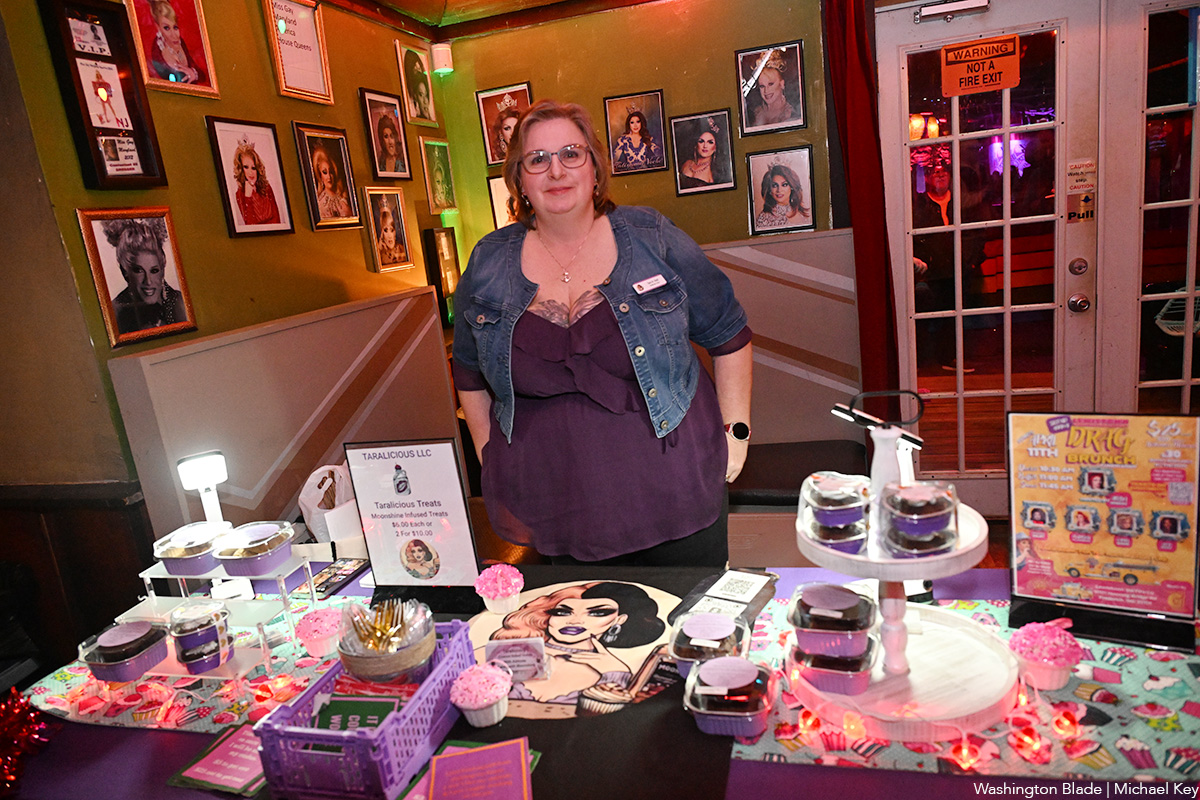
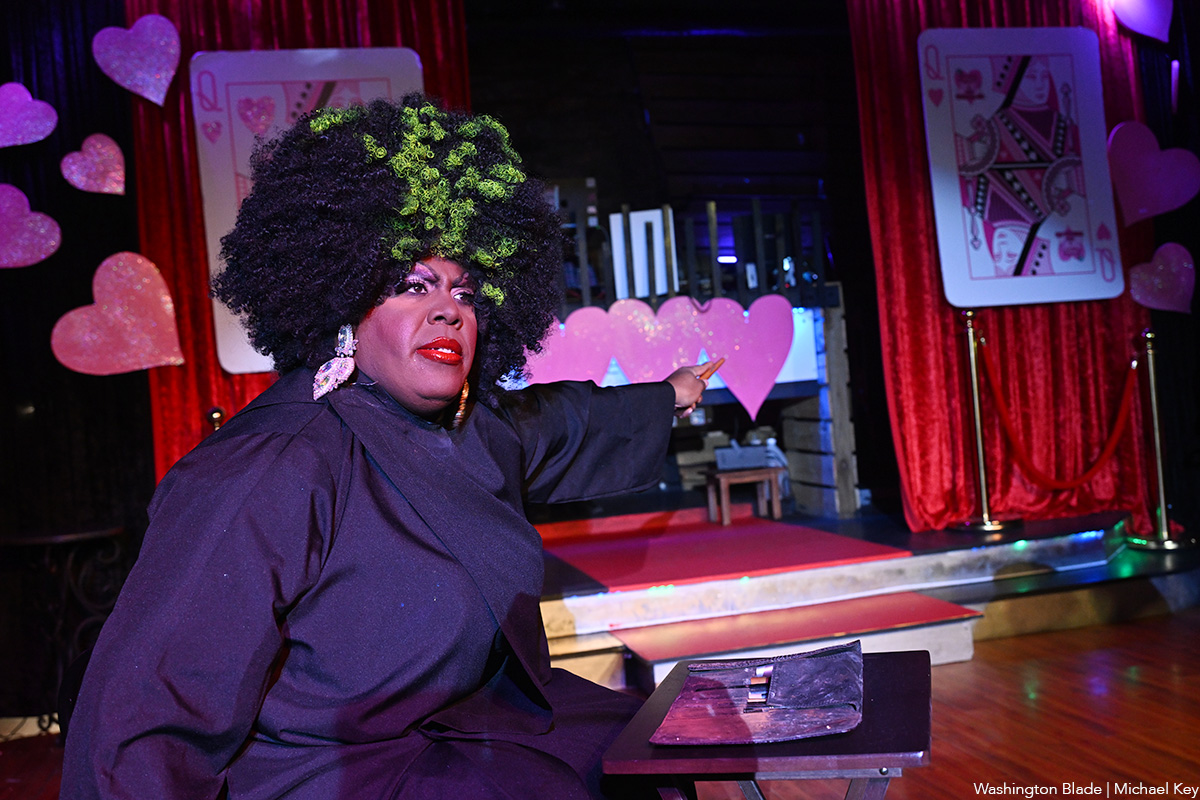
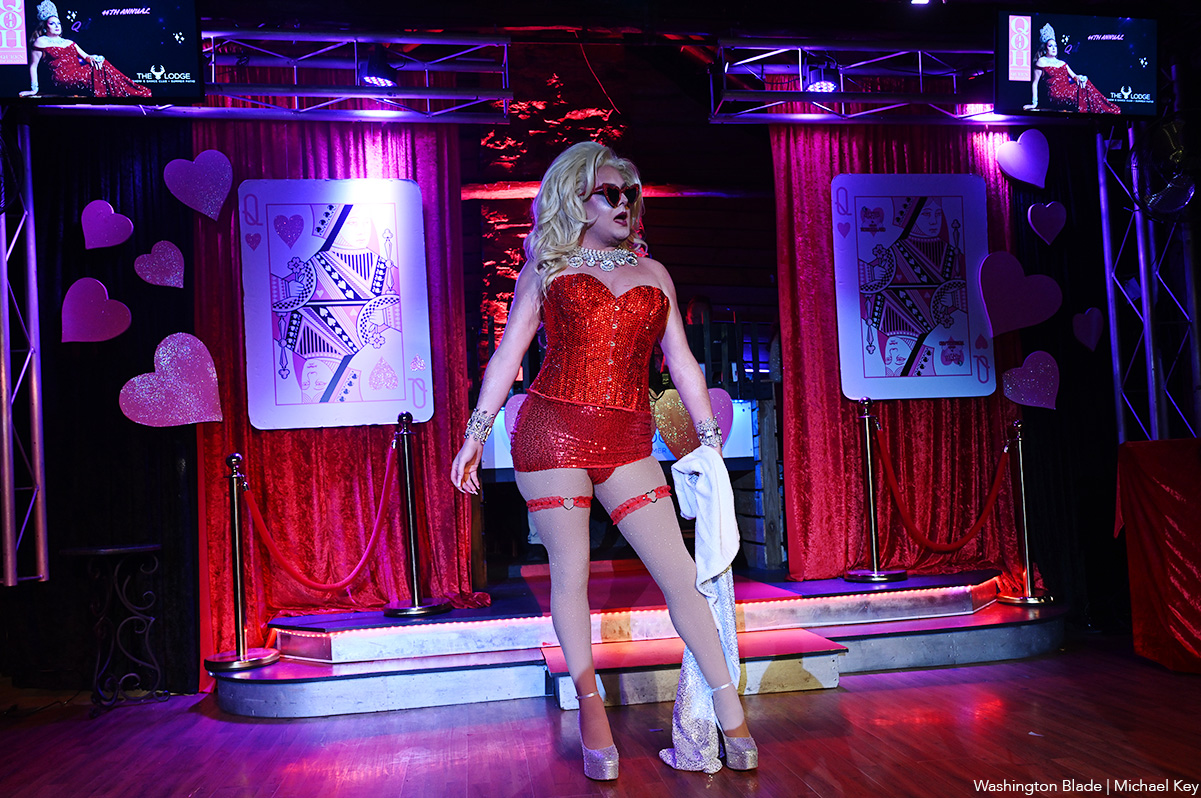
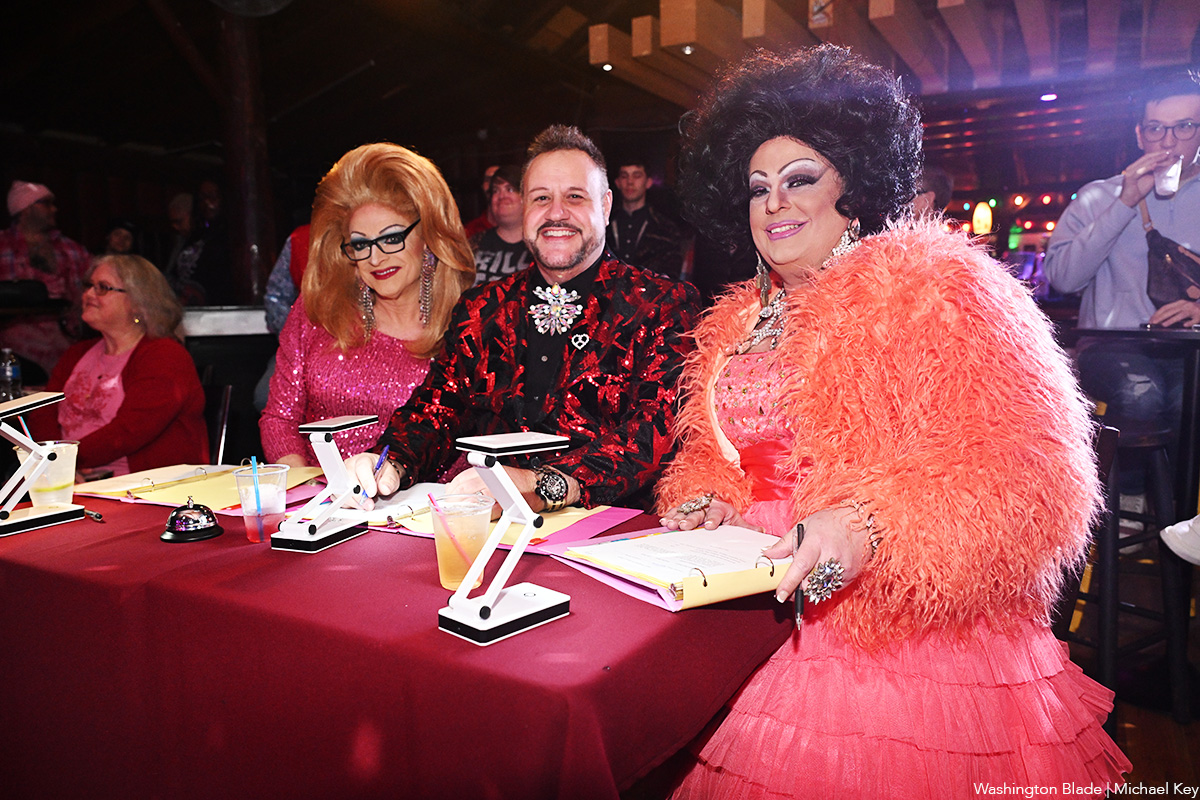
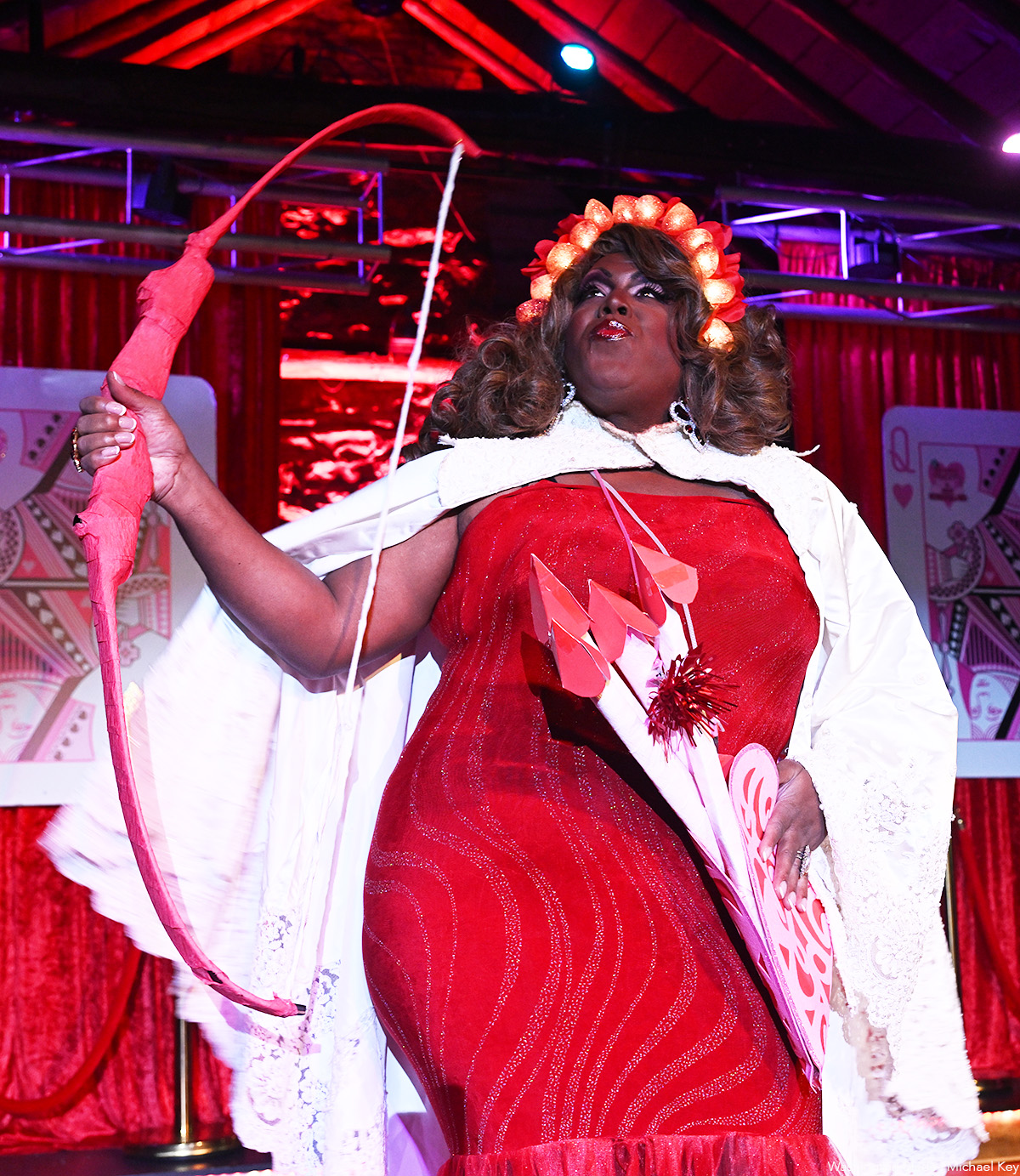
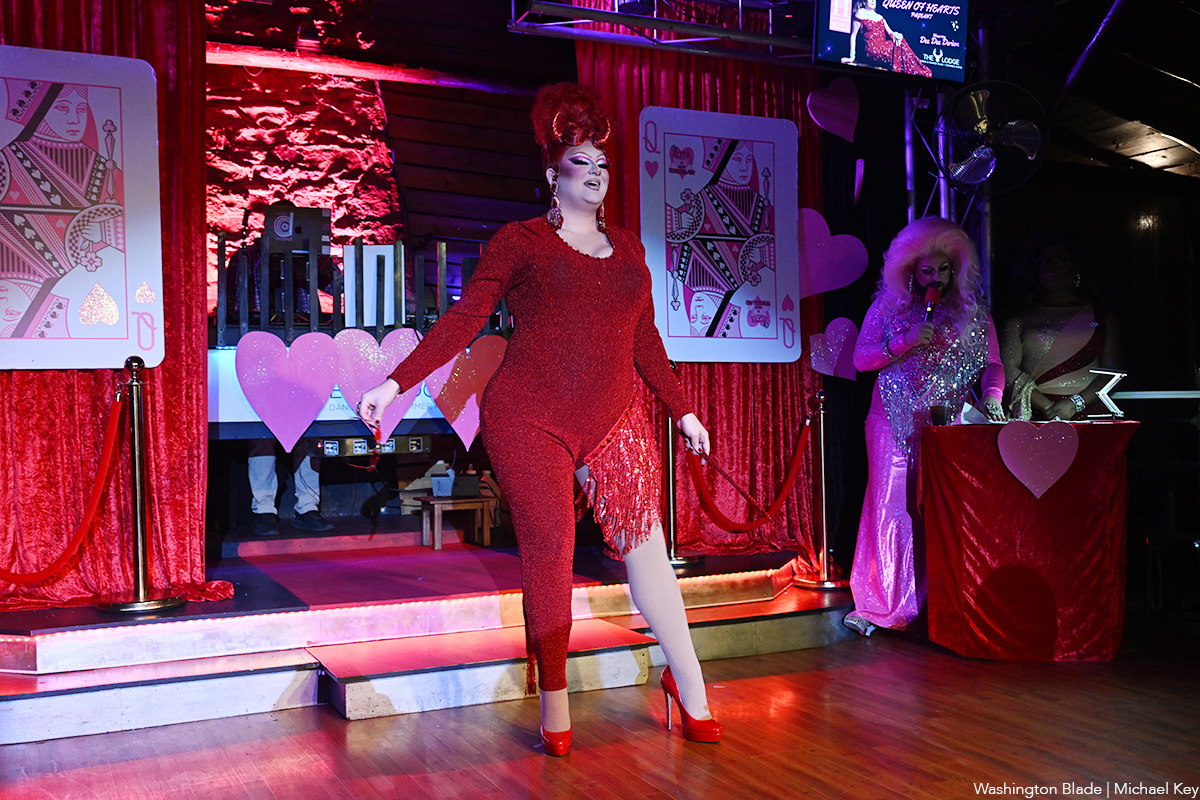
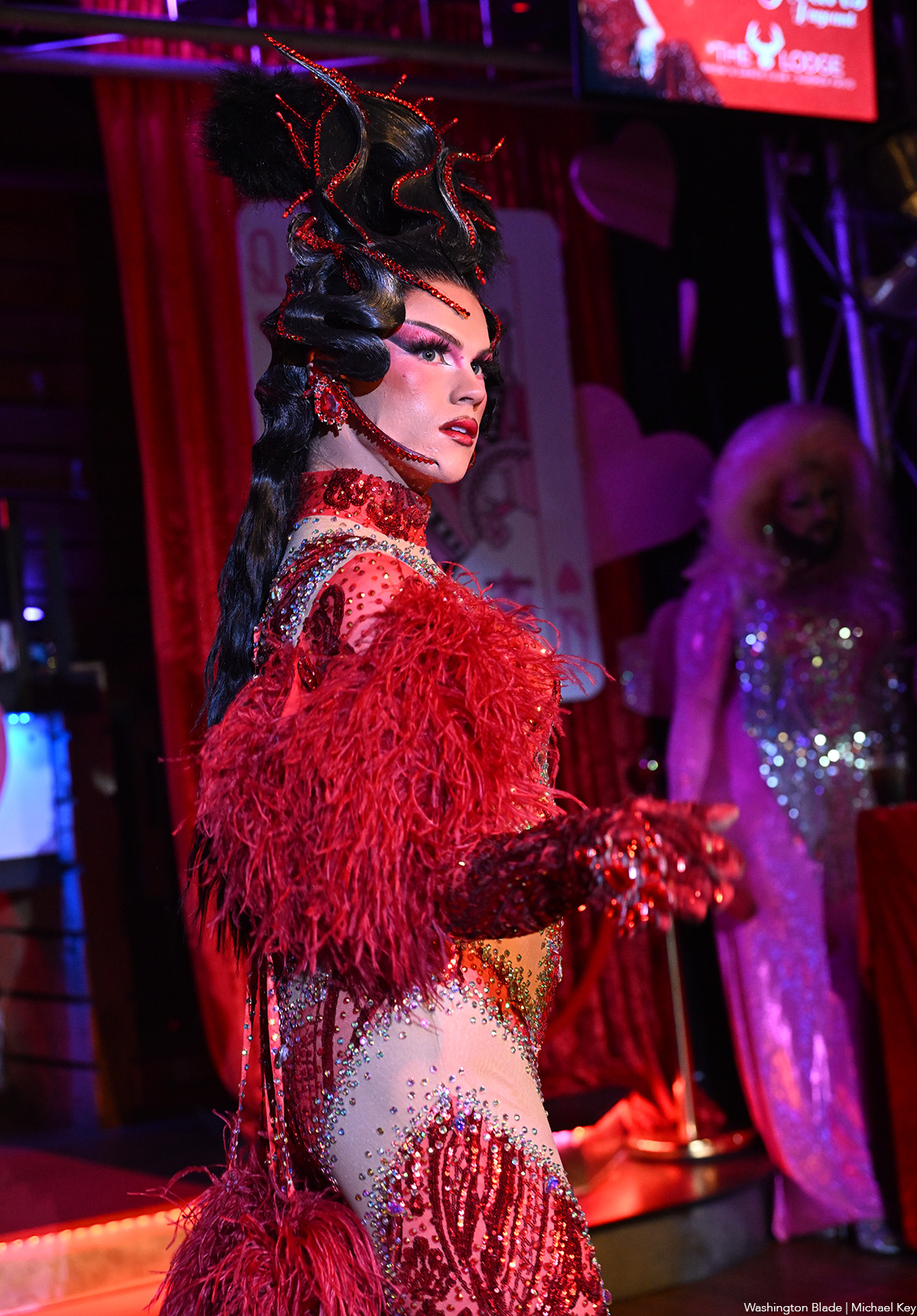
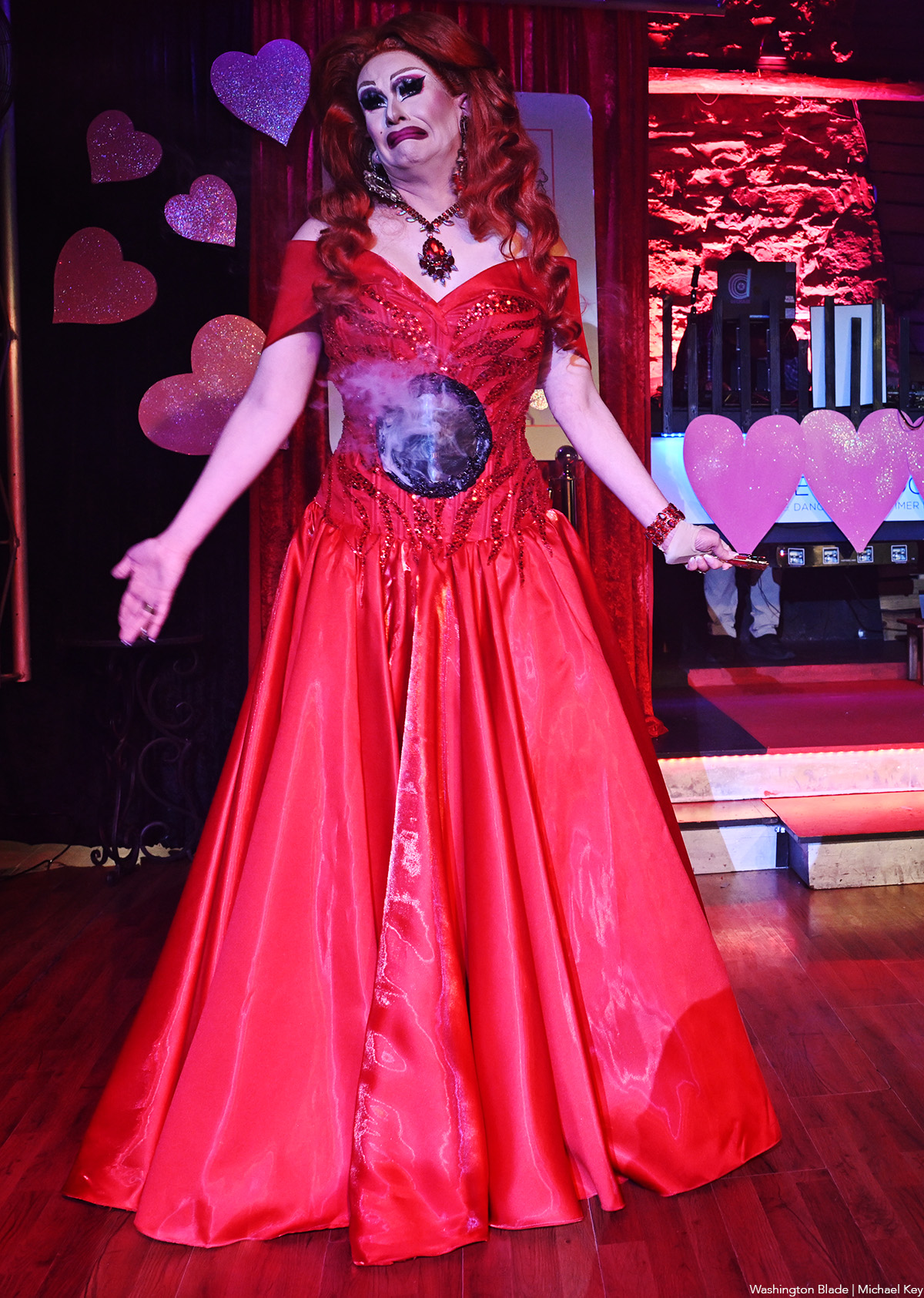
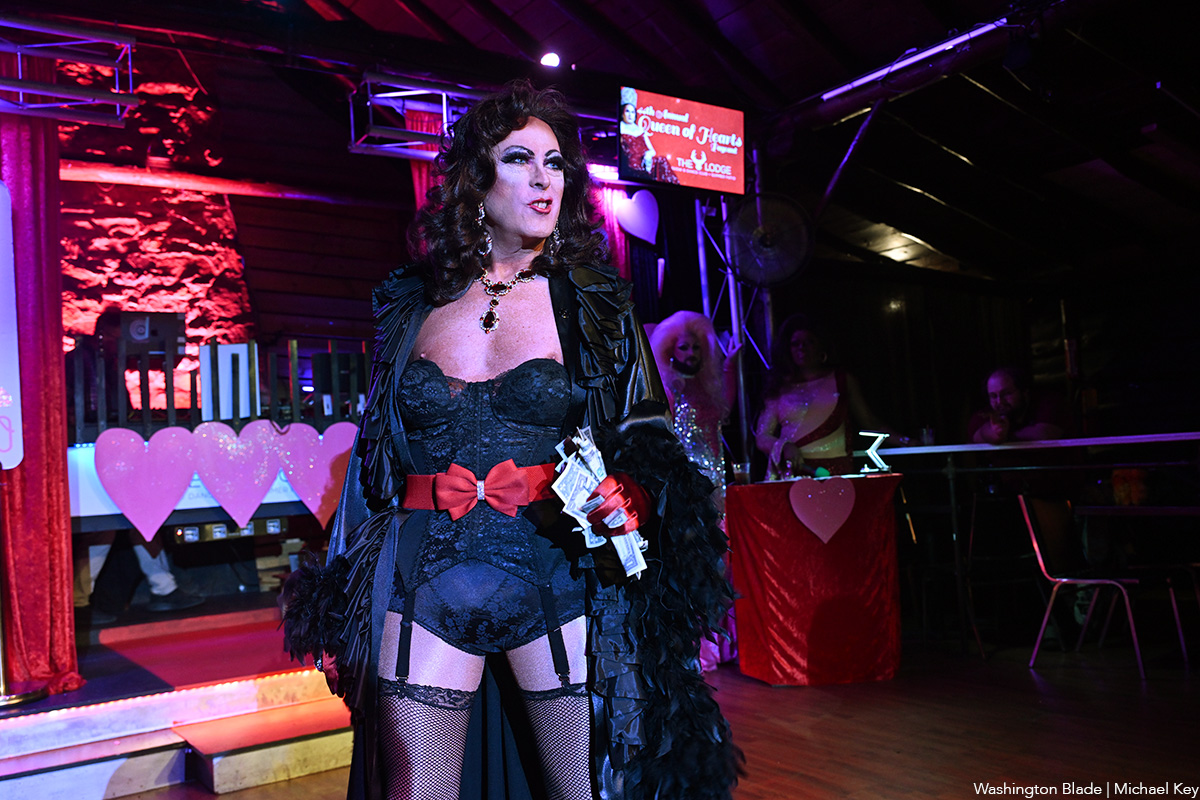
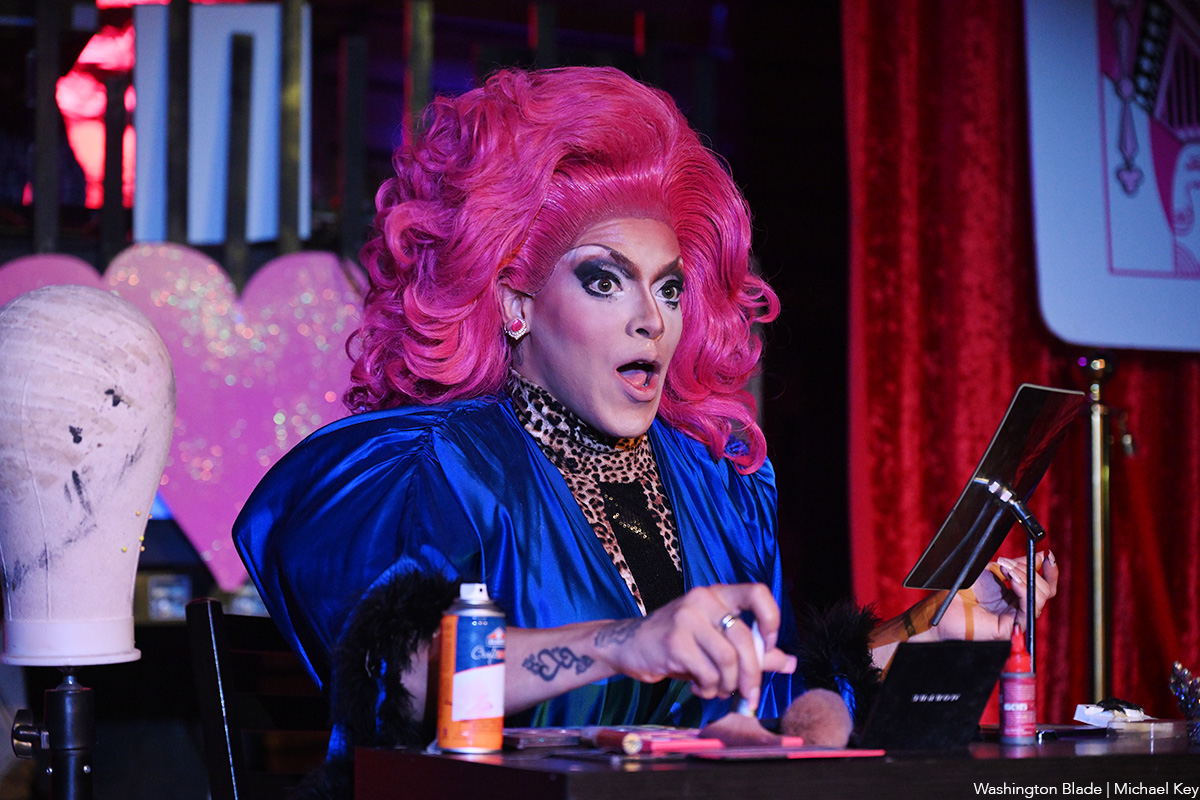
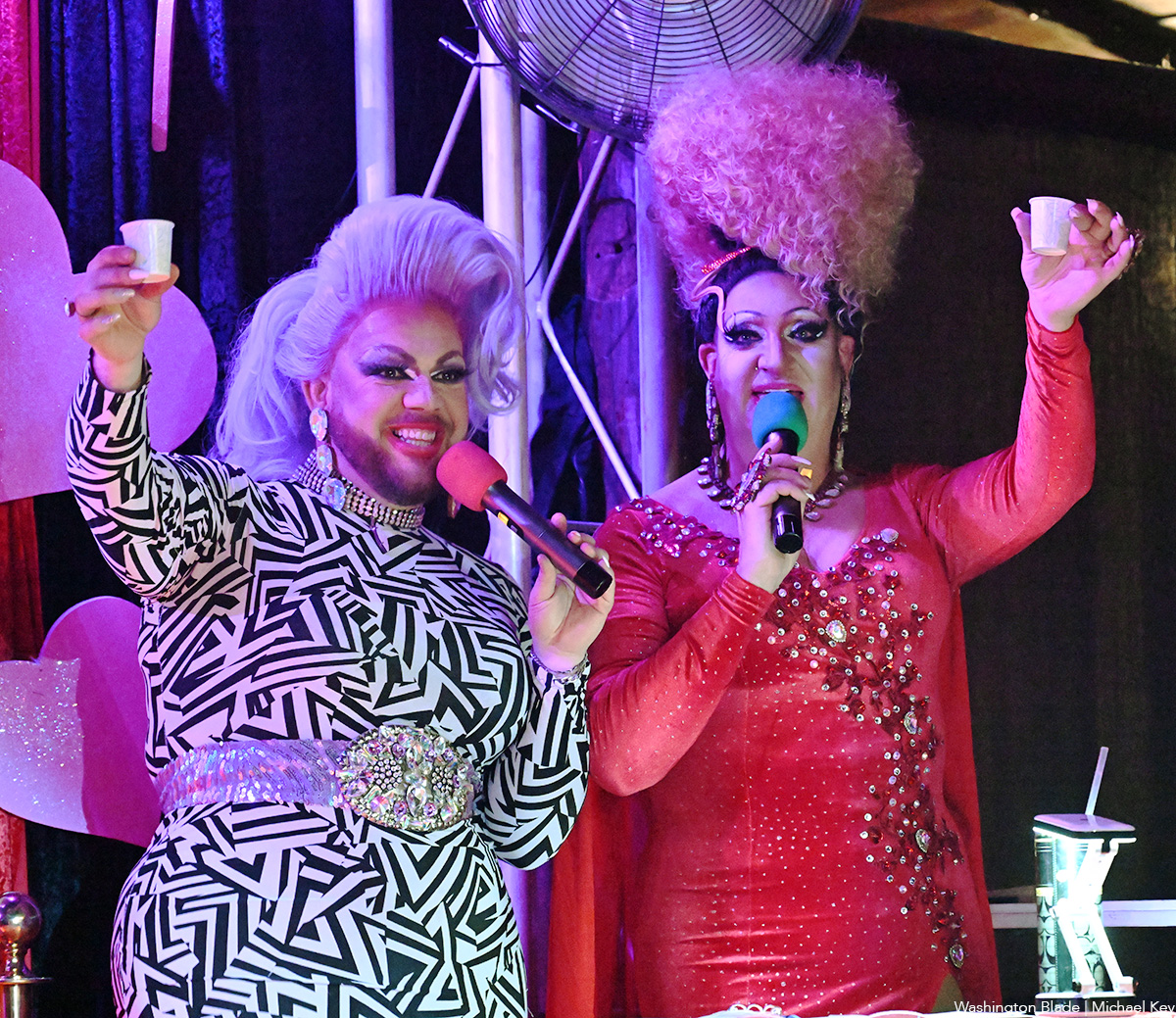
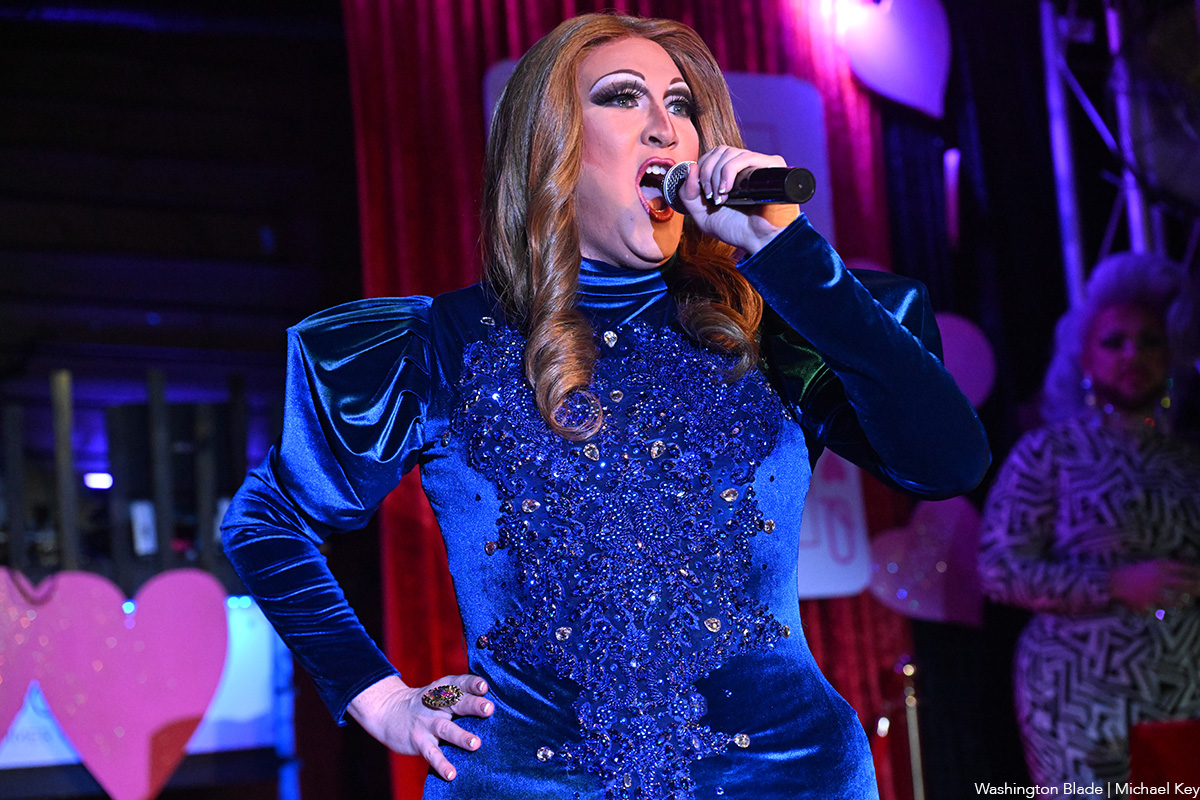
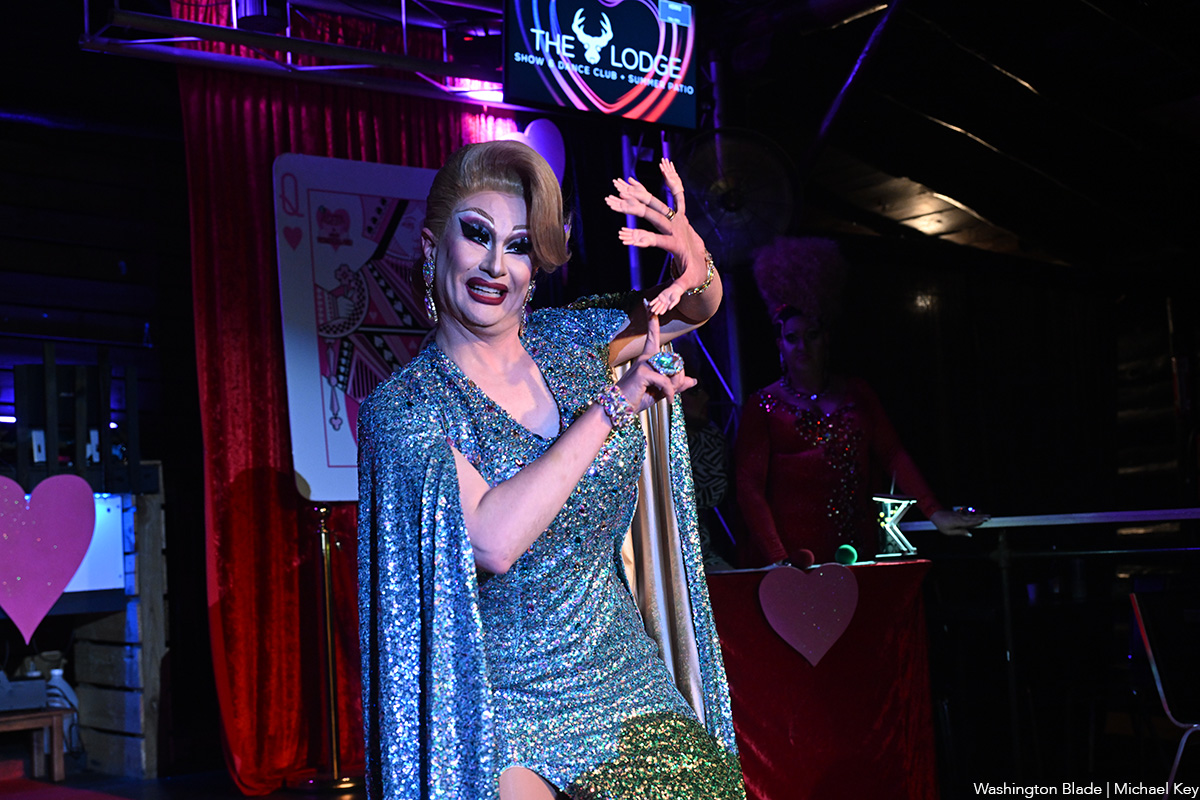
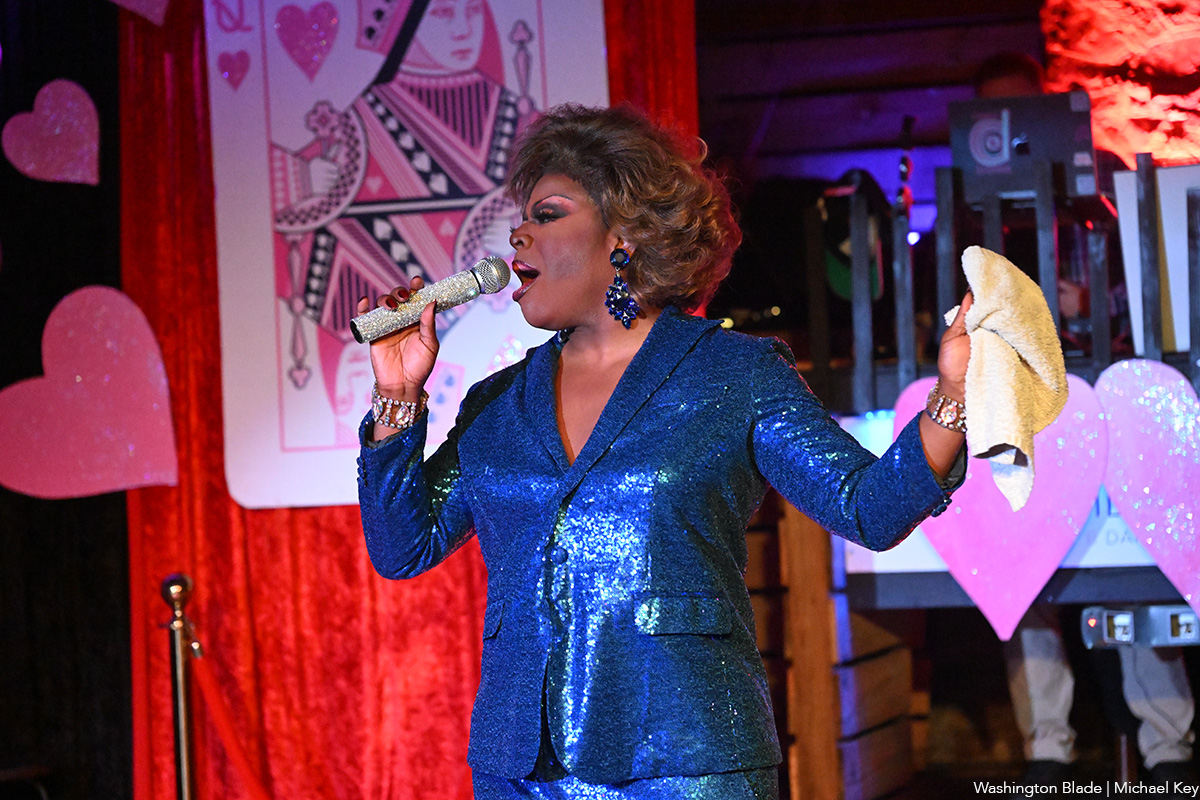
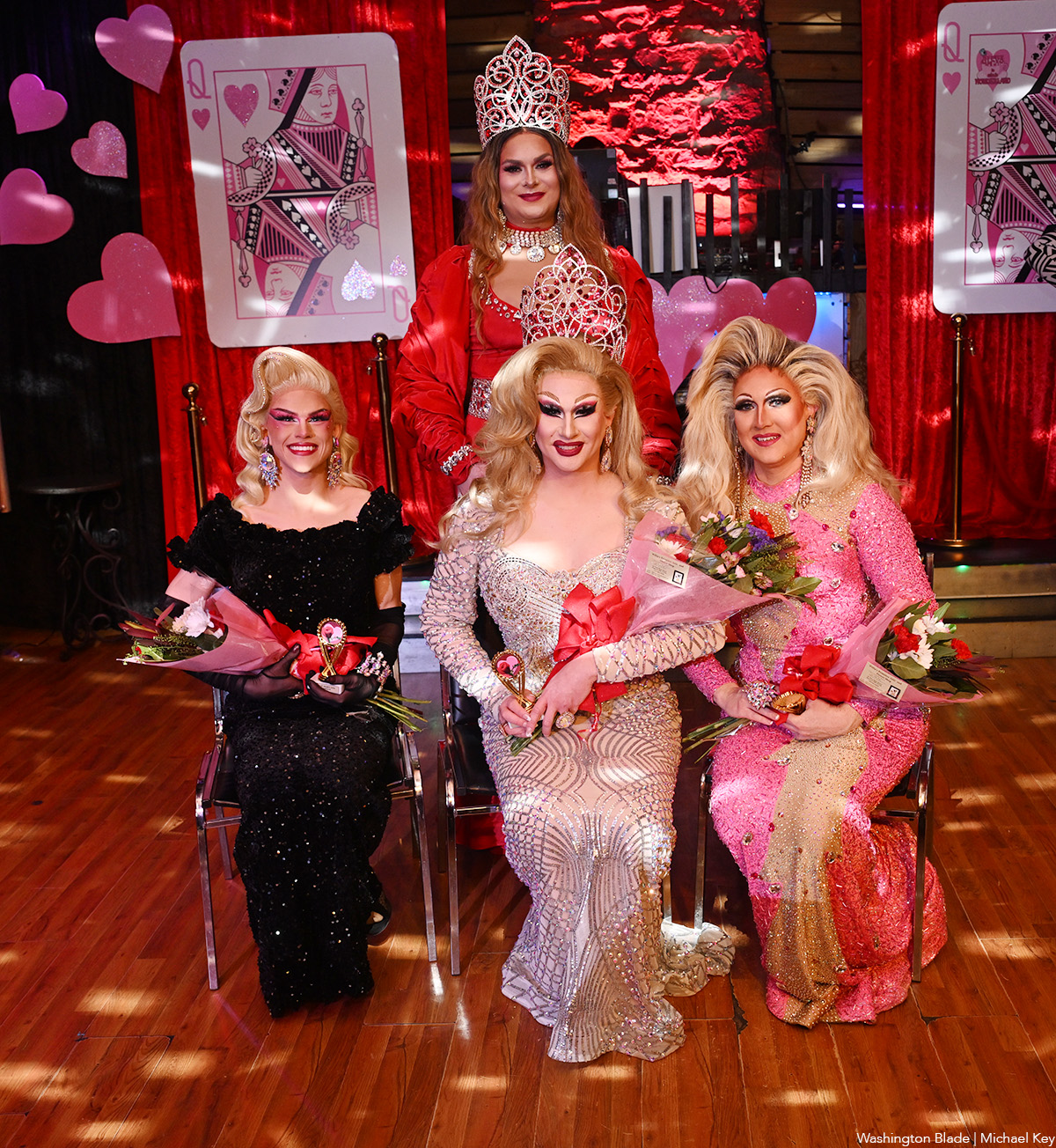
View on Threads
Books
New book profiles LGBTQ Ukrainians, documents war experiences
Tuesday marks four years since Russia attacked Ukraine

Journalist J. Lester Feder’s new book profiles LGBTQ Ukrainians and their experiences during Russia’s war against their country.
Feder for “The Queer Face of War: Portraits and Stories from Ukraine” interviewed and photographed LGBTQ Ukrainians in Kyiv, the country’s capital, and in other cities. They include Olena Hloba, the co-founder of Tergo, a support group for parents and friends of LGBTQ Ukrainians, who fled her home in the Kyiv suburb of Bucha shortly after Russia launched its war on Feb. 24, 2022.
Russian soldiers killed civilians as they withdrew from Bucha. Videos and photographs that emerged from the Kyiv suburb showed dead bodies with their hands tied behind their back and other signs of torture.

Olena Shevchenko, chair of Insight, a Ukrainian LGBTQ rights group, wrote the book’s forward.

The book also profiles Viktor Pylypenko, a gay man who the Ukrainian military assigned to the 72nd Mechanized Black Cossack Brigade after the war began. Feder writes Pylypenko’s unit “was deployed to some of the fiercest and most important battles of the war.”
“The brigade was pivotal to beating Russian forces back from Kyiv in their initial attempt to take the capital, helping them liberate territory near Kharkiv and defending the front lines in Donbas,” wrote Feder.
Pylypenko spent two years fighting “on Ukraine’s most dangerous battlefields, serving primarily as a medic.”
“At times he felt he was living in a horror movie, watching tank shells tear his fellow soldiers apart before his eyes,” wrote Feder. “He held many men as they took their final breaths. Of the roughly one hundred who entered the unit with him, only six remained when he was discharged in 2024. He didn’t leave by choice: he went home to take care of his father, who had suffered a stroke.”
Feder notes one of Pylypenko’s former commanders attacked him online when he came out. Pylypenko said another commander defended him.
Feder also profiled Diana and Oleksii Polukhin, two residents of Kherson, a port city in southern Ukraine that is near the mouth of the Dnieper River.
Ukrainian forces regained control of Kherson in November 2022, nine months after Russia occupied it.
Diana, a cigarette vender, and Polukhin told Feder that Russian forces demanded they disclose the names of other LGBTQ Ukrainians in Kherson. Russian forces also tortured Diana and Polukhin while in their custody.
Polukhim is the first LGBTQ victim of Russian persecution to report their case to Ukrainian prosecutors.

Feder, who is of Ukrainian descent, first visited Ukraine in 2013 when he wrote for BuzzFeed.
He was Outright International’s Senior Fellow for Emergency Research from 2021-2023. Feder last traveled to Ukraine in December 2024.
Feder spoke about his book at Politics and Prose at the Wharf in Southwest D.C. on Feb. 6. The Washington Blade spoke with Feder on Feb. 20.
Feder told the Blade he began to work on the book when he was at Outright International and working with humanitarian groups on how to better serve LGBTQ Ukrainians. Feder said military service requirements, a lack of access to hormone therapy and documents that accurately reflect a person’s gender identity and LGBTQ-friendly shelters are among the myriad challenges that LGBTQ Ukrainians have faced since the war began.
“All of these were components of a queer experience of war that was not well documented, and we had never seen in one place, especially with photos,” he told the Blade. “I felt really called to do that, not only because of what was happening in Ukraine, but also as a way to bring to the surface issues that we’d had seen in Iraq and Syria and Afghanistan.”

Feder also spoke with the Blade about the war’s geopolitical implications.
Russian President Vladimir Putin in 2013 signed a law that bans the “promotion of homosexuality” to minors.
The 2014 Winter Olympics took place in Sochi, a Russian resort city on the Black Sea. Russia annexed Crimea from Ukraine a few weeks after the games ended.
Russia’s anti-LGBTQ crackdown has continued over the last decade.
The Russian Supreme Court in 2023 ruled the “international LGBT movement” is an extremist organization and banned it. The Russian Justice Ministry last month designated ILGA World, a global LGBTQ and intersex rights group, as an “undesirable” organization.
Ukraine, meanwhile, has sought to align itself with Europe.
Ukrainian President Volodymyr Zelenskyy after a 2021 meeting with then-President Joe Biden at the White House said his country would continue to fight discrimination based on sexual orientation and gender identity. (Zelenskyy’s relationship with the U.S. has grown more tense since the Trump-Vance administration took office.) Zelenskyy in 2022 publicly backed civil partnerships for same-sex couples.
Then-Ukrainian Ambassador to the U.S. Oksana Markarova in 2023 applauded Kyiv Pride and other LGBTQ and intersex rights groups in her country when she spoke at a photo exhibit at Ukraine House in D.C. that highlighted LGBTQ and intersex soldiers. Then-Kyiv Pride Executive Director Lenny Emson, who Feder profiles in his book, was among those who attended the event.
“Thank you for everything you do in Kyiv, and thank you for everything that you do in order to fight the discrimination that still is somewhere in Ukraine,” said Markarova. “Not everything is perfect yet, but you know, I think we are moving in the right direction. And we together will not only fight the external enemy, but also will see equality.”
Feder in response to the Blade’s question about why he decided to write his book said he “didn’t feel” the “significance of Russia’s war against Ukraine” for LGBTQ people around the world “was fully understood.”
“This was an opportunity to tell that big story,” he said.
“The crackdown on LGBT rights inside Russia was essentially a laboratory for a strategy of attacking democratic values by attacking queer rights and it was one as Ukraine was getting closet to Europe back in 2013, 2014,” he added. “It was a strategy they were using as part of their foreign policy, and it was one they were using not only in Ukraine over the past decade, but around the world.”
Feder said Republicans are using “that same strategy to attack queer people, to attack democracy itself.”
“I felt like it was important that Americans understand that history,” he said.

More than a dozen LGBTQ athletes won medals at the Milan Cortina Winter Olympics that ended on Sunday.
Cayla Barnes, Hilary Knight, and Alex Carpenter are LGBTQ members of the U.S. women’s hockey team that won a gold medal after they defeated Canada in overtime. Knight the day before the Feb. 19 match proposed to her girlfriend, Brittany Bowe, an Olympic speed skater.
French ice dancer Guillaume Cizeron, who is gay, and his partner Laurence Fournier Beaudry won gold. American alpine skier Breezy Johnson, who is bisexual, won gold in the women’s downhill. Amber Glenn, who identifies as bisexual and pansexual, was part of the American figure skating team that won gold in the team event.
Swiss freestyle skier Mathilde Gremaud, who is in a relationship with Vali Höll, an Austrian mountain biker, won gold in women’s freeski slopestyle.
Bruce Mouat, who is the captain of the British curling team that won a silver medal, is gay. Six members of the Canadian women’s hockey team — Emily Clark, Erin Ambrose, Emerance Maschmeyer, Brianne Jenner, Laura Stacey, and Marie-Philip Poulin — that won silver are LGBTQ.
Swedish freestyle skier Sandra Naeslund, who is a lesbian, won a bronze medal in ski cross.
Belgian speed skater Tineke den Dulk, who is bisexual, was part of her country’s mixed 2000-meter relay that won bronze. Canadian ice dancer Paul Poirier, who is gay, and his partner, Piper Gilles, won bronze.
Laura Zimmermann, who is queer, is a member of the Swiss women’s hockey team that won bronze when they defeated Sweden.
Outsports.com notes all of the LGBTQ Olympians who competed at the games and who medaled.

